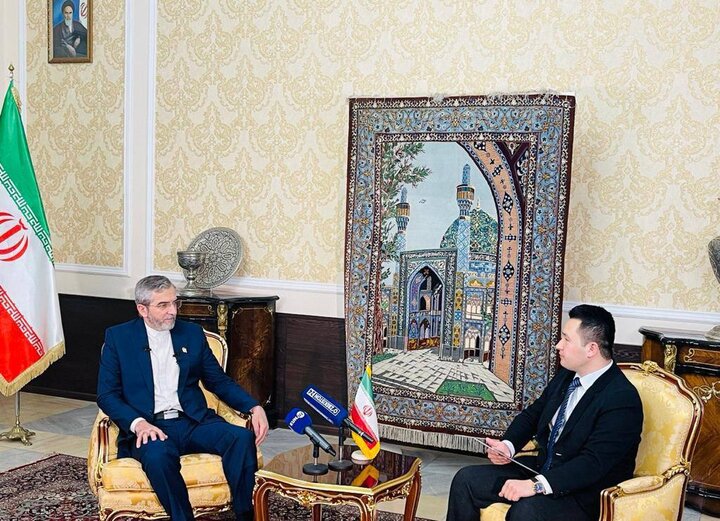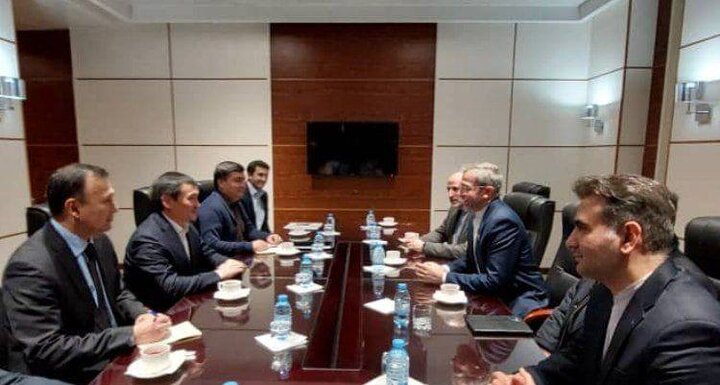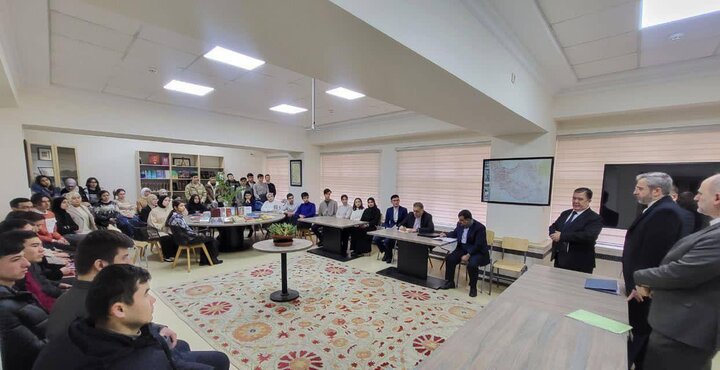
Iranian Deputy Foreign Minister Ali Bagheri, who has traveled to Tashkent to take part in the seventh round of political talks between Iran and Uzbekistan, met with the Deputy Speaker of the Legislative Chamber of Uzbekistan and Chairman of the Iran-Uzbekistan Friendship Group, Alisher Kadyrov, the webiste of the Iranian foreign ministry reported.
Highlighting the historical and cultural commonalities between the two countries, Kadyrov said the presidents of Iran and Uzbekistan are determined to promote bilateral ties.

He added that the influential role of the two countries’ parliaments in consolidating and expediting their relations is ‘undeniable.’
He said the reciprocal trips by the Iranian Parliament Speaker Mohammad Baqer Qalibaf and his Uzbek counterpart Nuriddinjon Ismailov to Tashkent and Tehran were an objective manifestation of the interests by the two popular institutions.
Meanwhile, Bagheri said, “The depth of the long-standing relations between the two countries was formed in a popular context and for this reason it cannot be broken.”
“Iran and Uzbekistan are two largest countries in the region, and correspondingly, they have an important task in establishing regional peace and stability and amid all this the parliaments play a central role and can improve ties between the people and organize the mechanism of relations,” he added.
The Iranian deputy foreign minister for political affairs welcomed the interaction between the two parliaments besides the speakers at various levels, including fractions, parliamentary friendship groups and committees, saying it can stabilize the cordial ties.

Iran deputy FM to Uzbek media: Gaza war should immediately stop
Iran’s Deputy Foreign Minister for Political Affairs Ali Bagheri who is on a trip to Uzbekistan to hold the 7th round of political talks in the country had interviews with Uzbekistan 24 television channel and Uzbekistan Rooz news agency.
Iran’s Deputy Foreign Minister for Political Affairs Ali Bagheri, who is on a trip to Uzbekistan to hold the 7th round of political talks in the country, had interviews with Uzbekistan 24 television channel and Uzbekistan Rooz news agency.
During the interview, Bagheri highlighted the historical, civilizational and cultural affinities between the two countries, and referred to fruitful meetings between the heads of state of the two countries and the deals made during their meetings.
The deputy foreign minister underlined Iran’s capabilities and potentials in transportation, science and technology, tourism and transit fields, and stressed the Islamic Republic of Iran's strong determination to promote and develop bilateral ties with the friendly and brotherly country of Uzbekistan.
Meanwhile, Bagheri shed light on Iran’s efforts to stop the spread of tensions in the region after the Zionist regime’s savage aggression on the Gaza Strip.
He said Iran is cooperating with other regional countries to immediately stop the war and genocide against the oppressed Palestinian people, and facilitate Gazans’ access to food, medical and essential supplies, as well as the Zionist regime’s occupying forces’ unconditional pullout from Gaza.
Iran, Uzbekistan stress enhanced relations, cooperation
Iranian deputy FM Uzbek minister welcome expansion of transportation ties
Iran’s Deputy Foreign Minister for Political Affairs Ali Bagheri met with Uzbekistan’s Minister of Transport Ilkhom Makhkamov on the last day of his trip to Tashkent.
Iran’s Deputy Foreign Minister for Political Affairs Ali Bagheri met with Uzbekistan’s Minister of Transport Ilkhom Makhkamov on the last day of his trip to Tashkent.
In the meeting, Bagheri said his first visit to Uzbekistan and talks with the country’s officials were fruitful.
The deputy foreign minister said the expansion of ties with Uzbekistan, especially in the field of transportation, is a priority for Iran and hailed the Uzbek side for pursuing the same policy regarding Iran.
He said the talks held during the past few days were “effective” and “efficient”.
Bagheri also stated, “We will do our best to use the existing opportunities and capacities in our country to boost bilateral cooperation in various sectors.”
The Uzbek transportation minister, in turn, underlined Iran and Uzbekistan’s positions and their roles in the transit of goods between China and Europe.
Makhkamov said the southern Iranian ports play an ‘undeniable’ role in establishing a line between Uzbekistan to high seas, noting that the transit route to the Persian Gulf is economically viable.
Iran deputy PM meets directors of Tashkent University of Oriental Studies in Uzbekistan
Ali Bagheri, Iran's Deputy Foreign Minister for Political Affairs, who is in Uzbekistan to conduct the seventh round of political consultations, engaged in a brief meeting with the directors of Tashkent University of Oriental Studies, toured the Iran Room within the university, and conversed with its directors, professors, and students, to give a speech.
Bagheri expressed that Iran's accomplishments across various domains over the last 45 years since the Islamic Revolution, despite facing US sanctions, serve as a testament to the strength, expertise, and dedication of Iranian youth.
Providing examples of Iran's progress despite pressures and sanctions over the past four decades, Bagheri emphasized that the key to the Iranian youth's success in transforming the "threat of sanctions" into an "opportunity for progress" lies in their inherent "self-confidence."
Bagheri further remarked: "Despite the fact that effective interaction with different countries is the central strategy of Iran's foreign policy and does not conflict with the earnest endeavors to safeguard the borders of independence, ensuring the stability of progress relies on both not trusting the enemies and not relying on foreigners."
Bagheri asserted: "Given the shared cultural and civilizational ties and the presence of talented young people, Iran and Uzbekistan can forge a roadmap for interaction across various fields."
In closing, two Uzbek students, a boy and a girl, bid farewell to the high-ranking Iranian diplomat by reciting poems in Persian. / Mehr
